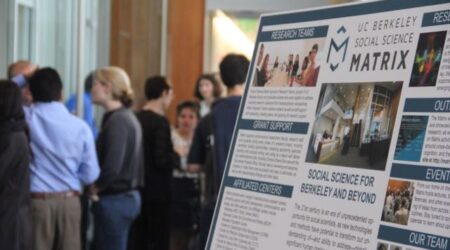Social Science Matrix: Network for Adolescent Well-being and Development from Social Science Matrix on Vimeo.
Matrix has produced a three-minute video profiling the “Network for Adolescent Wellbeing and Development” (NAWD), a Social Science Matrix Project Team that ran during the 2016-2017 academic year. The goal of this team is to develop innovative approaches for research into key issues related to adolescent health, including technology and adolescent well-being, violence prevention, methodological innovations, and reproductive health.
Adolescents make up one-fifth of the world’s population, and many low-income countries are experiencing a “youth bulge,” with a higher proportion of their population made up of adolescents. In the U.S. and globally, youth of color and those in conditions of poverty experience major health and educational disparities. Yet the field of adolescent health is typically organized around individual problems such as pregnancy, sexually-transmitted infections, or violence. What is lacking is an integrative development lens that factors in how contexts—such as families, schools, neighborhoods—shape adolescent health and behavior.
“Adolescence is such a really key pivot point in terms of the trajectory of the life course,” says Emily J. Ozer, PhD, Professor of Community Health and Human Development in the UC Berkeley School of Public Health, who co-led this Matrix Research Team. “It’s really where a lot gets decided in terms of, health and mental health, transition to family, transition to work. There’s a huge demographic increase in adolescents worldwide, particularly in low- and middle-income countries.”
This Matrix Team brings together some of the numerous faculty and students across campus whose work is relevant to the contexts and factors that shape adolescent development, including experts in diverse fields such as psychology, medicine, economics, neuroscience, social welfare, sociology, public health, education, policy, and information science.
“One particular discipline can’t do it and one particular scholar can’t do it, because no one knows the full ecology of young people’s lives,” says Prudence Carter, Dean of the Graduate School of Education at UC Berkeley. “No one is an expert in the full ecology. Collectively, we kind of speak to the full ecology of youth.”
Since the launch of their work at Matrix, this team received a grant from the UC Berkeley Vice Chancellor for Research Office (VCRO) to advance their work in reducing inequalities among youth. The “Youth and Inequalities” initiative—to be led by Ozer and Carter, along with Colette Auerswald, Associate Professor in the UC Berkeley School of Public Health—will further strengthen connections with education and economics, as well as other units across campus. The researchers will also continue collaborating with Innovations for Youth (I4Y), a growing UC Berkeley center that focuses on the social determinants of health, health disparities, connectedness, and networks for adolescents through a multidisciplinary and multigenerational approach.
“It’s very hard to get faculty together at Berkeley,” says Ozer. “And so when I saw this opportunity to apply for a Social Science Matrix Group, it was a great opportunity to provide some structure and a place and some support and to have a standing meeting for us to get together over lunch, exchange ideas, and just really put some structure around what we’ve been trying to do.”
Visit this page to learn more about this initiative. You can also download a PDF of a poster about this team’s work.


